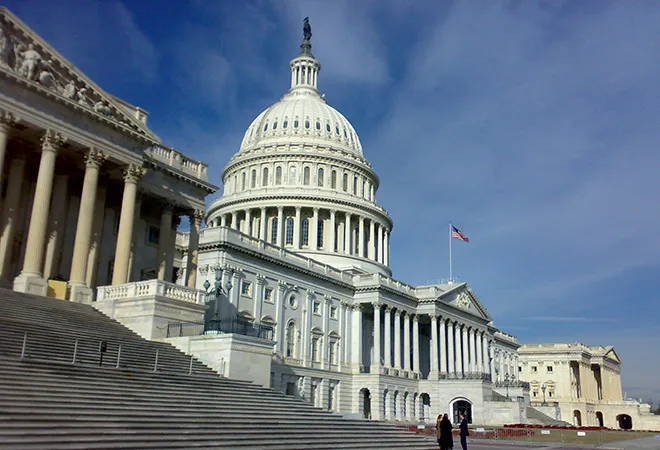-
CENTRES
Progammes & Centres
Location
The two House Resolutions on Kashmir reflect moderate to extreme conceptions on the role of values in US foreign policy, but both emphasise the centrality of shared values as the core of US-India ties.

Earlier this month, Rep. Pramila Jayapal (D-WA-07) tabled a House Resolution (H. Res. 745) “urging the Republic of India to end the restrictions on communications and mass detentions in Jammu and Kashmir as swiftly as possible and preserve religious freedom for all residents.”
This followed another House Resolution (H. Res. 724), tabled in late November by Rep. Rashida Tlaib (D-MI-13). Moreover, that resolution even goes on to diverge from long-standing US policy – which the Donald Trump administration has come around to adhere to after the initial kerfuffle over an offer to mediate. Straying from the American tacit adherence to the Indian position against internationalising Kashmir, the resolution calls for “condemning the human rights violations taking place in Jammu and Kashmir.” Additionally – and what may be construed as a challenge to India’s sovereignty, this house resolution also calls for supporting “Kashmiri self-determination.”
In further understanding the two resolutions – and probing their impact on US-India bilateral ties, it is first important to underscore the domestic political context informing the Democrats’ increased emphases on a values-centric US foreign policy.
As the centres of gravity of the Republican and Democratic parties shift into their respective populist extremes, polarisation in the American political spectrum now seems like the standard pre-set. Political polarisation has gradually crept in over the past decade owing to continued legislative deadlock on urgent domestic issues like gun control and immigration reform. With Donald Trump’s 2016 election campaign, however, those gridlocked issues – mainly over immigration, became the crux of his populist message.
With Trump’s victory, the Democratic Party faced questions over its raison d'être, as they were caught off-guard by Trump’s ability to gin up a populist movement surrounding the working class in middle America. Thus, in the run up to the 2018 midterm elections and thereafter, the Democratic Party has also seen its own turn for populism. Their call for addressing income inequality and institutionalised racism, serves as their defence for keeping pace with globalism rather than deriding the American ‘melting pot’ culture altogether. This socio-economic populism is defined in opposition to the Trump Republicans’ turn for socio-cultural populism on multiculturalism’s threat to the American identity.
Similarly, US foreign policy – long known to be the only facet of American polity that could boast of unfettered bipartisanship, has also become a ground for American partisan pulling-and-hauling. The bipartisan consensus on US foreign policy has been under considerable strain since the end of the Cold War, especially due to mounting fatigue with American hegemonic excesses like regime change wars in the post 9/11 timeline. With the ascent of Trump, however, that schism has become more pronounced as the ‘America First’ worldview has forced a conversation on recalibrating the US’ role in world. At the core of which, is the Trump administration’s transactional take on some core tenets of US foreign policy, like American stewardship of liberal Wilsonian values and maintaining regional balances of power via alliance commitments.
Here, the Democrats’ further shift to the left encompasses the progressive ‘new left’ – identified by the likes of Ilhan Omar (D-MN-05) and Rashida Tlaib, claiming absolute moral distinction in direct opposition to the Trump administration’s values-bereft ‘America First’ pursuit of US interests. Thus, on the foreign policy front, the socio-cultural populism of the right translates into a narrative of realpolitik pursuit of American interests. In contrast, the new left’s definition of itself in opposition to that actualisation of interests irrespective of the means, leaves them susceptible of being construed as soft on American interests abroad. Moreover, in claiming moral absolutism, it also often lends it a binary worldview. This was most apparent in Rep. Omar’s recent critique of American support for Israel coming across “as playing into well-worn anti-Semitic tropes.”
On American support for India, this schism between Republicans and Democrats was most apparent in the recent Congressional hearings on human rights in South Asia. Wherein, US support for India fell prey to partisanship as Democrats berated Trump’s ambivalence on India’s communications blackout in Kashmir, while Republicans dampened criticism by rallying against a values-centric US foreign policy.
In the two House Resolutions on Kashmir tabled in the Democrat-led US House of Representatives, the in-party tussle between the ‘new left’ and the erstwhile establishment’s foreign policy of balancing values and interests is writ large.
The two resolutions differ on their scope. The one tabled by Rep. Jayapal largely centres on the “6,000,000 mobile subscribers in Jammu and Kashmir” that “remain inoperable for communication, and text messaging and mobile internet services remain suspended”. Whereas, the resolution tabled by Rep. Tlaib mainly centres on “gross human rights abuses in Jammu and Kashmir” and even “supporting Kashmiri self-determination”.
Concurrently, the latter also deems India to have “unilaterally changed the status of Jammu and Kashmir without a direct consultation or the consent of the Kashmiri people”. Whereas, Rep. Jayapal’s resolution does not reference the Narendra Modi government’s decision to abrogate Jammu and Kashmir’s special status enshrined in Article 370 – possibly to be in line with the Donald Trump administration’s take on the move being India’s “internal matter”.
Although both resolutions in varying degrees criticise India for detentions, forbidding travel of journalists, and the resultant derailment of health services to the civilian population, the resolution by Rep. Jayapal stands out in recognising “external state support for the insurgency” in Kashmir. Referencing the Pulwama attacks which killed about 40 security personnel, the resolution deems the perpetrator to have been a “member of a Pakistan-based, United States-designated foreign terrorist organisation”. Moreover, in urging the Indian government to lift the “remaining restrictions on communication and to restore internet access across all of Jammu and Kashmir as swiftly as possible”, it prefaces the same with the recognition of “the dire security challenges faced by the Government and India in Jammu and Kashmir and continuing threat of state-supported cross-border terrorism”.
Possibly due to this recognition of nuance, Rep. Jayapal’s resolution has bipartisan support with Rep. Steve Watkins (R-KS-02) as the original cosponsor. Apart from that, over a dozen Democratic House Representatives have come aboard as cosponsors. This includes heavyweights like Rep. James McGovern (D-MA-02) who is the co-chair of The Tom Lantos Human Rights Commission (formerly, the Congressional Human Rights Caucus) and Rep. Adam Schiff (D-CA-28) who is the chair of the House Intelligence Committee. Whereas, Rep. Tlaib’s resolution has had no takers as cosponsors.
Later this week at the second US-India 2+2 ministerial dialogue, Indian and American foreign and defence cabinet chiefs will oversee the clearance of crucial US arms transfers to India. The two sides are also expected to ink the Industrial Security Annex (ISA) towards the actualisation of the US-India Defence Technology and Trade Initiative (DTTI). With these impending developments on the strategic front, Alice G Wells – the acting US Assistant Secretary of State for South and Central Asia, said human rights will not be a part of the upcoming US-India 2+2 dialogue.
Moreover, as Simple Resolutions, these House Resolutions seem to neither have the force of law, nor are sent to the US Senate once voted on in the House. It is also unclear if these resolutions shall even come up for vote in the House. At times, House Resolutions are merely introduced to convey the manner of debate on an issue – led by a set of American legislators lending their name as sponsors/cosponsors. For instance, the House Resolution tabled in May 2019 by Rep. Brad Sherman (D-CA-30) – the co-chair of the Congressional Caucus on India and Indian Americans, condemning the terror attack in Pulwama has not come up for a vote to date.
However, it is crucial to recognise, even the mere introduction by House Democrats of two House Resolutions on Kashmir, bears ominous signs of India increasingly becoming a partisan issue in the American foreign policy consensus.
Judging by the mounting cosponsors on Rep. Jayapal’s resolution, whether the same will dent the promising trajectory of US-India ties depends largely on the Modi government’s decision to keep in-place the communications lockdown in Kashmir. Although it must be acknowledged that New Delhi has indeed lifted the communications lockdown — albeit in a phased manner. For instance, in October, it was reported that mobile services — barring text messaging and internet, were restored for nearly 40 lakh postpaid connections. This followed September’s restoration of 46,000 landline connections. On the suspension of internet services however, according to a recent report, earlier this week the same “entered its 134th day” to now make it “the longest ever imposed in a democracy, according to Access Now, an international advocacy group that tracks Internet suspensions.”
Lastly, irrespective of the apparent divide between the two resolutions on the varying degrees to which values must inform US foreign policy, both crucially underscore the centrality of shared democratic values animating contemporary US-India bilateral ties. That is something New Delhi must recognise regardless of the Democrats’ emphases on a values-led US foreign policy outlasting the Trump presidency’s transactional, interests-driven realpolitik worldview.
The views expressed above belong to the author(s). ORF research and analyses now available on Telegram! Click here to access our curated content — blogs, longforms and interviews.

Kashish Parpiani is Senior Manager (Chairman’s Office), Reliance Industries Limited (RIL). He is a former Fellow, ORF, Mumbai. ...
Read More +